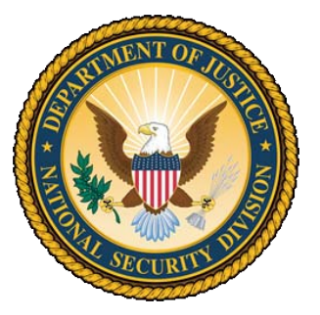
The Federal Bureau of Investigation (FBI) is the domestic intelligence and security service of the United States and its principal federal law enforcement agency. An agency of the United States Department of Justice, the FBI is also a member of the U.S. Intelligence Community and reports to both the Attorney General and the Director of National Intelligence. A leading U.S. counterterrorism, counterintelligence, and criminal investigative organization, the FBI has jurisdiction over violations of more than 200 categories of federal crimes.

The Commission on the Intelligence Capabilities of the United States Regarding Weapons of Mass Destruction is a panel created by Executive Order 13328, signed by U.S. President George W. Bush in February 2004.

The Counterterrorism Division (CTD) is a division of the National Security Branch of the Federal Bureau of Investigation. CTD investigates terrorist threats inside the United States, provides information on terrorists outside the country, and tracks known terrorists worldwide. In the wake of the September 11 attacks in 2001, CTD's funding and manpower have significantly increased.

The Bureau of Intelligence and Research (INR) is an intelligence agency in the United States Department of State. Its central mission is to provide all-source intelligence and analysis in support of U.S. diplomacy and foreign policy. INR is the oldest civilian element of the U.S. Intelligence Community and among the smallest, with roughly 300 personnel. Though lacking the resources and technology of other U.S. intelligence agencies, it is "one of the most highly regarded" for the quality of its work.

The United States Naval Criminal Investigative Service (NCIS) is the primary investigative law enforcement agency of the U.S. Department of the Navy. Its primary function is to investigate major criminal activities involving the Navy and Marine Corps, though its broad mandate includes national security, counterintelligence, counterterrorism, cyberwarfare, and the protection of U.S. naval assets worldwide. NCIS is the successor organization to the former Naval Investigative Service (NIS), which was established by the Office of Naval Intelligence after the Second World War.
The Critical Incident Response Group (CIRG) is a division of the Criminal, Cyber, Response, and Services Branch of the United States Federal Bureau of Investigation. CIRG enables the FBI to rapidly respond to, and effectively manage, special crisis incidents in the United States.
Charles A. Duelfer is Chairman of Omnis, Inc., a consulting firm in aerospace, defense, intelligence, training, and finance. He is a regular commentator in the media on intelligence and foreign policy and is the author of Hide and Seek: The Search for Truth in Iraq.

The National Security Branch (NSB) is a service within the Federal Bureau of Investigation. The NSB is responsible for protecting the United States from weapons of mass destruction, acts of terrorism, and foreign intelligence operations and espionage. The NSB accomplishes its mission by investigating national security threats, providing information and analysis to other law enforcement agencies, and developing capabilities to keep the US nation secure.

The United States Department of Justice National Security Division (NSD) handles national security functions of the department. Created by the 2005 USA PATRIOT Act reauthorization, the division consolidated all of the department's national security and intelligence functions into a single division. The division is headed by the Assistant Attorney General for National Security.
The National Science Advisory Board for Biosecurity (NSABB) is a panel of experts that reports to the Secretary of the United States Department of Health and Human Services. It is tasked with recommending policies on such questions as how to prevent published research in biotechnology from aiding terrorism, without slowing scientific progress.
Presidential Decision Directive 62 (PDD-62), titled Combating Terrorism, was a Presidential Decision Directive (PDD), signed on May 22, 1998 by President Bill Clinton. It identified the fight against terrorism a top national security priority.

Gordon M. Snow was an Assistant Director of the FBI over the Cyber Division through 2012, the FBI Director of Counterintelligence for the Middle East in 2001, and currently directs Global Security Operations for Cleveland Clinic.

The Science and Technology Branch (STB) is a service within the Federal Bureau of Investigation that comprises three separate divisions and three program offices. The goal when it was founded in July 2006 was to centralize the leadership and management of the three divisions. The mission of the STB is discover, develop, and deliver innovative science and technology so that intelligence and innovative investigation is enhanced.
The Human Resources Branch (HRB) is a service within the Federal Bureau of Investigation. The HRB is responsible for all internal human resources needs of the FBI and for conducting the FBI Academy to train new FBI agents.

The Counterintelligence Division (CD) is a division of the National Security Branch of the Federal Bureau of Investigation. The division protects the United States against foreign intelligence operations and espionage. It accomplishes its mission of hunting spies and preventing espionage through the use of investigation and interaction with local law enforcement and other members of the United States Intelligence Community. In the wake of the September 11, 2001 attacks, the division's funding and manpower have significantly increased.

The Intelligence Branch (IB) division of the Federal Bureau of Investigation (FBI) handles all intelligence functions, including information sharing policies and intelligence analysis for national security, homeland security, and law enforcement purposes. The IB operates through the use of embedded intelligence strategies.

The Criminal Investigative Division (CID) is a division within the Criminal, Cyber, Response, and Services Branch of the Federal Bureau of Investigation. The CID is the primary component within the FBI responsible for overseeing FBI investigations of traditional crimes such as narcotics trafficking and violent crime.

Sean M. Joyce was the 14th Deputy Director of the Federal Bureau of Investigation.

John Philip Mudd is an American media commentator and former counterterrorism official in the Central Intelligence Agency (CIA) and Federal Bureau of Investigation (FBI).















